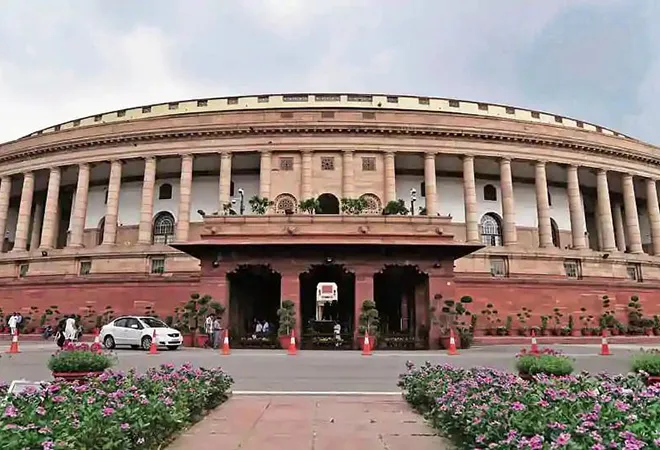
The furore over
factionalism in the ruling Congress in Rajasthan and the
question regarding the leadership of the party at the national-level in recent months has once again made it extremely important to understand the larger issues of inner-party democracy in political parties in the country. India is one of the most vibrant and robust multi-party democracies in the world which has sustained despite all challenges for over seven decades now. And the political parties, like in any other modern democracy, have been the major driver of democratic politics and governmental power in the country.
But interestingly, there are no explicit
provisions in the Indian Constitution that lays down guidelines for regulating the conduct of the political parties in India. There is no mention of political parties either in the statute. Only Section 29 (A) of the Representation of the People Act, 1951
mandates the registration of political parties. The Election Commission of India (ECI) is also not equipped to regulate the functioning of the political parties.
In the case of ‘Indian National Congress
vs Institute of Social Welfare & Others’ of 2002, the Supreme Court
held that the ECI cannot take punitive action against registered political parties for violating the principles of inner-party democracy. The court, acknowledging the de-registering powers of the registering authority, maintained that the issue of political parties is different from other forms of registration. This makes the regulation of the conduct and functioning of the political parties extremely difficult, reducing the chances of democratic working of parties in the country.
Major challenges
As political parties are the most crucial actors of Indian democracy, their democratic functioning becomes inextricably inter-linked to the health and vibrancy of the former. The lack of democratic functioning of the parties is mainly manifested in two fundamental aspects. First, the procedure for
determining the leadership and composition of the parties are
not completely open and inclusive. This adversely
impacts the constitutional right of all citizens to equal political opportunity to participate in politics and contest elections.
Second, the
centralised mode of functioning of the political parties and the
stringent anti-defection law of 1985 deters party legislators from voting in the national and state legislatures according to their individual preferences. The anti-defection legislation requires the elected representatives to strictly follow the party whip during legislative voting. Failure of do so results in the disqualification of their membership from the legislature.
Leadership and composition
In most of the major political parties, the elections to organisational posts at various levels are fraught with challenges. It has been observed that the leadership is
mostly decided by a coterie of party functionaries who holds sway over the party administration. Even when elections take place in which the members of the national organisational or decision-making body of the party participate, the pre-determined choice of the party elite is merely supported by the other members.
Most of the times, the elections to leadership positions are uncontested and unanimously decided. In many instances, the ceremonial rubber stamp organisational elections are also held after long intervals
with serious irregularities.
The composition of the party elite in the political parties is also a major concern in India. Multiple research findings have suggested that centralised and ambiguous working of the parties that led to distribution of party ticket to certain sections of the population and excluding the rest of the society. Reports
suggest that party members with adequate social and financial resources are given primacy while distributing tickets for contesting elections.
Also, a
large number of candidates with criminal background as party nominees has come to the forefront in the recent times. The Supreme Court has also taken
cognisance of the growing prevalence of ‘criminalisation of politics’ in India. As no legally enforceable mechanism is in place for the parties, the lack of democratic functioning has kept a large section of people from the leadership positions and election nominations for political contests.
Freedom for legislators
The democratic spirit is not only
found wanting in terms of the representativeness of the party functionaries but also in case of the elected representative of the parties. The Anti-Defection Act of 1985 requires the party legislators to act according to the party whip which is decided by the diktats of the highest party leadership. This Act was brought in place in order to defer unabashed horse trading of lawmakers for breaking and making governments by manipulating legislative majorities. However, the contemporary political scenario vividly suggests that the law has achieved very little in terms of its original intention.
Rather the Act has done further
damage to the cause of inner-party democracy
as “the obligatory whip that theact imposes on the party legislators compels them to adhere to the directives oftheir party high-command in the legislature. Therefore, the discretional autonomyof the legislators becomes hostage to the whims of the party leadership”. Hence, the elected representatives are likely to remain accountable and answerable to their party leadership and its authority rather than to the electoral constituency which has elected the candidate to the legislature.
Need for political will
Thus, the lack of transparency and accountability in the inner functioning of the political parties in India have serious consequences for the steady functioning of parliamentary democracy in the country. Lack of free and fair internal elections, questionable procedure of distributing party tickets, the lack of information regarding the candidates contesting elections and the murky domain of campaign finance urgently
requires a serious public deliberation regarding the increasing
need for political party reforms.
As this article has
pointed out, there is a number of suggestions on electoral reforms that has been put forward “by several government constituted committees like the Dinesh Goswami Committee, the Tarkunde Committee and Indrajit Gupta Committee, which strongly argued for more transparent working of the political parties in the country. The 1999 Law Commission Report strongly recommended the introduction of a regulatory framework for governing the internal structures and inner party democracy of the political parties. Even, a draft Political Parties (Registration and Regulation of Affairs) Act, 2011 was submitted to the Union Law Ministry.
The draft envisaged the creation of an Executive Committee for every political party whose members would be elected by the members of the local committees of the state units of the party. The latter, in turn, would elect the office-bearers of the party from amongst themselves, without accepting any nomination.
Political parties control the levers of governance in a democracy. So only strong political will emanating from irrefutable electoral demands for inner-party democracy can only lead India towards the process of democratising its political parties.
This essay originally appeared in South Asia Weekly
The views expressed above belong to the author(s). ORF research and analyses now available on Telegram! Click here to access our curated content — blogs, longforms and interviews.



 The furore over
The furore over  PREV
PREV


